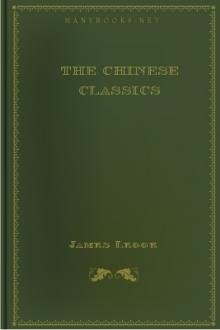author - "James Legge"

lly grow up.Filial piety and fraternal submission!-- are they not the root ofall benevolent actions?'CHAP. III. The Master said, 'Fine words and aninsinuating appearance are seldom associated with true virtue.'CHAP. IV. The philosopher Tsang said, 'I daily examinemyself on three points:-- whether, in transacting business forothers, I may have been not faithful;-- whether, in intercoursewith friends, I may have been not sincere;-- whether I mayhave not mastered and practised the instructions of myteacher.'
¡i²Ä¤³¹¡j¤l¤ê¡B¹D¤d¼¤§°ê¡B·q¨Æ¦Ó«H¡B¸`¥Î¦Ó·R¤H¡B¨Ï¥Á¥H®É¡C¡i²Ä¤»³¹¡j¤l¤ê¡B§Ì¤l¡B¤J«h§µ¡B¥X«h§Ì¡BÂÔ¦Ó«H¡B¤Z·R²³¡B¦Ó¿Ë¤¯¡B¦æ¦³¾l¤O¡B«h¥H¾Ç¤å¡C¡i²Ä¤C³¹¡j¤l®L¤ê¡B½å½å©ö¦â¡B¨Æ¤÷¥À¡B¯àºÜ¨ä¤O¡B¨Æ§g¡B¯àP¨ä¨¡BCHAP. V. The Master said, To rule a country of a thousandchariots, there must be reverent attention to business, andsincerity; economy in expenditure, and love for men; and theemployment of the people at the proper seasons.'CHAP. VI. The Master said, 'A youth, when at home

attributed to Confucius. But much of the Li Chi is from later hands. Of the Yi, the Shu, and the Shih, it is only in the first that we find additions attributed to the philosopher himself, in the shape of appendixes. The Ch'un Ch'iu is the only one of the five Ching which can, with an approximation to correctness, be described as of his own 'making.'
1 ¤¸g.
2 ¥|®Ñ.
3 ©ö¸g.
4 ®Ñ¸g.
5 ¸Ö¸g.
6 夡O.
7 ¬K¬î.
'The Four Books' is an abbreviation for 'The Books of the Four Philosophers [1].' The first is the Lun Yu [2], or 'Digested Conversations,' being occupied chiefly with the sayings of Confucius. He is the philosopher to whom it belongs. It appears in this Work under the title of 'Confucian Analects.' The second is the Ta Hsio [3], or 'Great Learning,' now commonly attributed to Tsang Shan [4], a disciple of the sage. He is he philosopher of it.

opher of it. The third is the Chung Yung [5], or 'Doctrine of the Mean,' as the name has often been translated, though it would be better to render it, as in the present edition, by 'The State of Equilibrium and Harmony.' Its composition is ascribed to K'ung Chi [6], the grandson of Confucius. He is the philosopher of it. The fourth contains the works of Mencius.
3. This arrangement of the Classical Books, which is commonly supposed to have originated with the scholars of the Sung dynasty, is defective. The Great Learning and the Doctrine of the Mean are both found in the Record of Rites, being the thirty-ninth and twenty-eighth Books respectively of that compilation, according to the best arrangement of it.
4. The oldest enumerations of the Classical Books specify only the five Ching. The Yo Chi, or 'Record of Music [7],' the remains of which now form one of the Books in the Li Chi, was sometimes added to those, making with them the six Ching. A division was also made into nine Ching, consistin

lly grow up.Filial piety and fraternal submission!-- are they not the root ofall benevolent actions?'CHAP. III. The Master said, 'Fine words and aninsinuating appearance are seldom associated with true virtue.'CHAP. IV. The philosopher Tsang said, 'I daily examinemyself on three points:-- whether, in transacting business forothers, I may have been not faithful;-- whether, in intercoursewith friends, I may have been not sincere;-- whether I mayhave not mastered and practised the instructions of myteacher.'
¡i²Ä¤³¹¡j¤l¤ê¡B¹D¤d¼¤§°ê¡B·q¨Æ¦Ó«H¡B¸`¥Î¦Ó·R¤H¡B¨Ï¥Á¥H®É¡C¡i²Ä¤»³¹¡j¤l¤ê¡B§Ì¤l¡B¤J«h§µ¡B¥X«h§Ì¡BÂÔ¦Ó«H¡B¤Z·R²³¡B¦Ó¿Ë¤¯¡B¦æ¦³¾l¤O¡B«h¥H¾Ç¤å¡C¡i²Ä¤C³¹¡j¤l®L¤ê¡B½å½å©ö¦â¡B¨Æ¤÷¥À¡B¯àºÜ¨ä¤O¡B¨Æ§g¡B¯àP¨ä¨¡BCHAP. V. The Master said, To rule a country of a thousandchariots, there must be reverent attention to business, andsincerity; economy in expenditure, and love for men; and theemployment of the people at the proper seasons.'CHAP. VI. The Master said, 'A youth, when at home

attributed to Confucius. But much of the Li Chi is from later hands. Of the Yi, the Shu, and the Shih, it is only in the first that we find additions attributed to the philosopher himself, in the shape of appendixes. The Ch'un Ch'iu is the only one of the five Ching which can, with an approximation to correctness, be described as of his own 'making.'
1 ¤¸g.
2 ¥|®Ñ.
3 ©ö¸g.
4 ®Ñ¸g.
5 ¸Ö¸g.
6 夡O.
7 ¬K¬î.
'The Four Books' is an abbreviation for 'The Books of the Four Philosophers [1].' The first is the Lun Yu [2], or 'Digested Conversations,' being occupied chiefly with the sayings of Confucius. He is the philosopher to whom it belongs. It appears in this Work under the title of 'Confucian Analects.' The second is the Ta Hsio [3], or 'Great Learning,' now commonly attributed to Tsang Shan [4], a disciple of the sage. He is he philosopher of it.

opher of it. The third is the Chung Yung [5], or 'Doctrine of the Mean,' as the name has often been translated, though it would be better to render it, as in the present edition, by 'The State of Equilibrium and Harmony.' Its composition is ascribed to K'ung Chi [6], the grandson of Confucius. He is the philosopher of it. The fourth contains the works of Mencius.
3. This arrangement of the Classical Books, which is commonly supposed to have originated with the scholars of the Sung dynasty, is defective. The Great Learning and the Doctrine of the Mean are both found in the Record of Rites, being the thirty-ninth and twenty-eighth Books respectively of that compilation, according to the best arrangement of it.
4. The oldest enumerations of the Classical Books specify only the five Ching. The Yo Chi, or 'Record of Music [7],' the remains of which now form one of the Books in the Li Chi, was sometimes added to those, making with them the six Ching. A division was also made into nine Ching, consistin